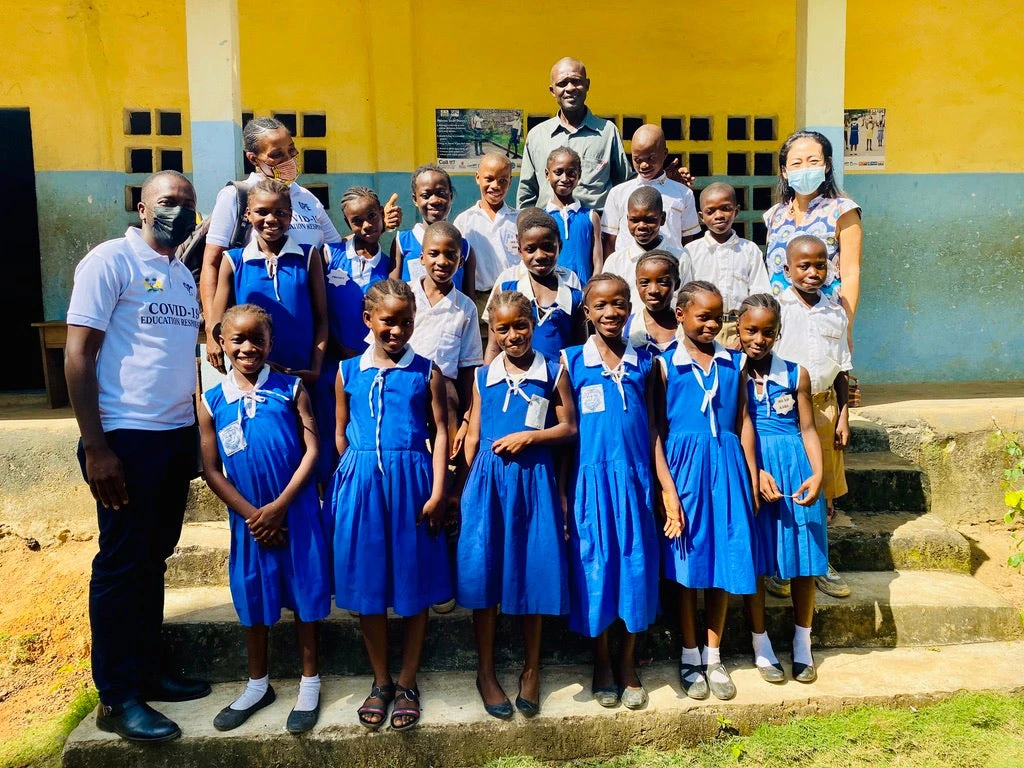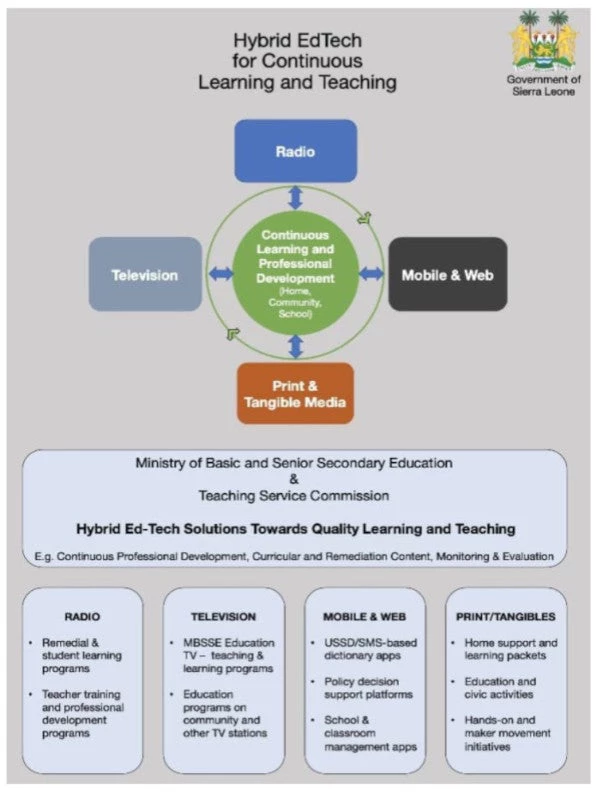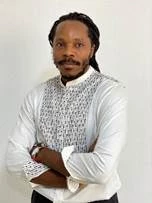 Students and their teacher in front of their school.
Students and their teacher in front of their school.
The COVID-19 pandemic has shown us that we need to reimagine our education systems if everyone is to benefit from them. In Sierra Leone, we are already up against a profound teaching and learning crisis in which a third of our education workforce has no formal training and four out of five children leave primary school without foundational skills. The situation is worse for children with disabilities, from low-income families, in rural areas, and for girls.
We have turned to technology to help us move toward the UN’s Sustainable Development Goal of inclusive, quality education for all. We know education technology alone cannot offer a “quick fix” and so we are taking an evidence-based approach to align it with a long-term vision for transforming Sierra Leone’s education sector.
In doing so, we have built on our experience during the 2014 Ebola crisis of developing a hybrid offering of education via radio, television, mobile phone, the web, and print media to ensure children can learn wherever they are and with whatever they have. We have also used radio, mobile, and print media to give teachers access to professional development, and we have focused on teachers at the schools that are furthest behind.
Our vision for EdTech revolves around delivery, and our plans for delivery revolve around data. In 2018, we digitized the Annual School Census, asking enumerators to use tablets to collect data from every school in the country. Now all stakeholders can access information on students, teachers, finances, and infrastructure via the publicly available Education Data Hub web portal. In 2021, we went one step further, giving senior secondary (high) school principals tablets and training them to upload their own census data.
In future, we will collect more real-time data to build up the annual snapshot of education this gives us in Sierra Leone. From the beginning of the 2022 academic year in January, we will also prepare some primary school leaders to use a tablet to collect, verify, and apply dynamic data to drive school improvement, managing teacher registration, student enrolment, and daily attendance. We are using this data to feed into cutting-edge geospatial and machine learning analyses designed to find ways to remove structural barriers to education. Where should we build schools so that underserved communities can physically access them? How can we improve the equity of teacher allocation? Where should we install radio transmitters to increase access to remote learning?
The answers to these key policy questions are guiding our decisions on how to make the most cost-effective investments for the process of radical inclusion, so that the people previously left out of education can access it too.
Support to school leaders and teachers
Teachers play a crucial role in our commitment to free, quality education for every child in Sierra Leone. We realize they need a structured, integrated package of training, as well as support and resources.
Here, we are using technology to expand and improve a teacher training model that we know works— school-based “communities of learning”, where teachers meet regularly to share experiences, reflect on practice, and plan new approaches in the classroom. Training delivered through technology will help teachers with interactive activities, such as role play, identify their strengths and weaknesses, and focus on micro skills or behavior that matters for learning. Teachers receive tailored feedback, resources to help their skills, and printed, digitized open resources, including lesson plans, workbooks, and other teaching aids.
By using technology to stimulate dialogue and critical reflection, we aim to radically transform the culture of teaching and learning. The success and sustainability of this will require the support of school leaders and district officials. Across the country, we are preparing principals and school quality assurance officers to use tablet-based lesson observation tools that generate
personalized feedback for teachers. This assessment is critical for identifying steps to improve instruction and monitor strategies.
➢ Re-drawing the boundaries of access to quality education
COVID-19 created an urgent need to develop hybrid education allowing children to learn anywhere, anytime. Yet, the sudden pivot to it risked exacerbating entrenched inequities and undermining our work to increase access. Our efforts to build a more resilient education system are based on the resources children have wherever they are.
During the pandemic, we worked with partners to relaunch the radio education program from the Ebola crisis. Soon after schools first closed, we built two new radio transmitters in Koinadugu and Falaba to expand the reach of remote learning. Now, we are in the process of carrying out more mapping of national radio coverage, informed by a recent transmission model, as we look to use broadcasts to supplement classroom instruction and support remedial learning.
We distributed home learning packages to enable all students to learn inside and outside the classroom. We are providing them curricular content and past exam questions on UNICEF’s online Learning Passport platform. Here, all students can find curriculum-aligned and quality-assured lessons and interactive tests. Soon, the platform will be available as a mobile app for students to access on and offline. We are also creating a free mobile dictionary to improve foundational learning. Any child with access to a basic feature phone can do a word search and subscribe to the word of the day via USSD or a free text message. Recently, we added a system for learners to check their National Primary School Exam results and placement through a free SMS.
We are still at the beginning of our journey to end Sierra Leone’s teaching and learning crisis. Our EdTech strategy will remain focused on delivering inclusive, quality education for all learners and teachers . We will continue to invest in data systems to reimagine planning and digitize diagnostic tools to deliver targeted support to every child, teacher, and school. Sierra Leonean innovators and educationalists have a wealth of ideas for transforming the sector. The challenge will be harnessing them to equalize and empower students and teachers alike.
We would like to acknowledge the invaluable support of our partners, including the FREE Project (the World Bank, the EU, FCDO and Irish Aid), UNICEF, EdTech Hub, Fab Inc, GRID3, Leh Wi Lan, and the Education Commission. The Free Education (FREE) Project was launched in October 2020.



Join the Conversation